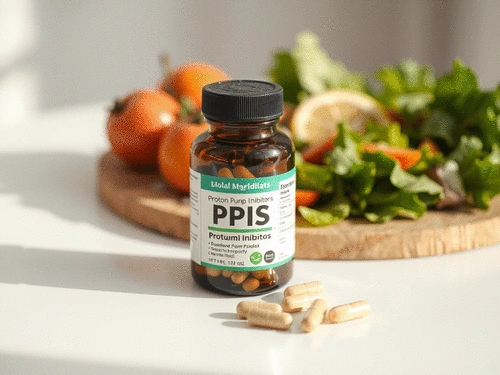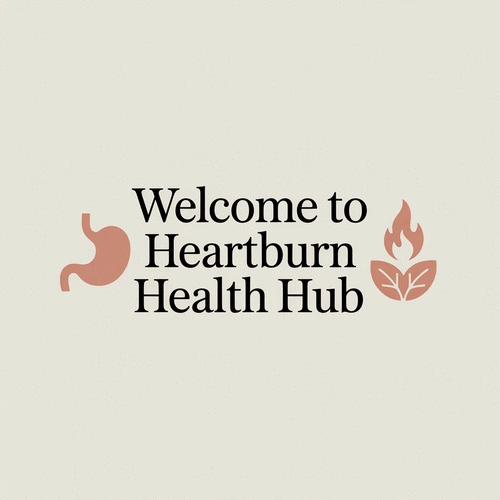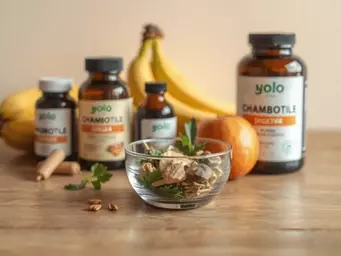Did you know that proton pump inhibitors (PPIs) can provide heartburn relief for up to 24 hours with just one dose? Understanding how these medications work can empower you in managing your digestive health.
What You Will Learn
- PPIs effectively block stomach acid production, alleviating heartburn symptoms.
- Long-term use of PPIs may pose risks, including potential kidney issues and bone fractures.
- Combining PPIs with lifestyle changes can enhance their effectiveness in managing heartburn.
- Understanding the difference between PPIs and H2 blockers can help you choose the right treatment.
PPIs vs. H2 Blockers: Key Differences in Heartburn Management
This visual highlights the primary distinctions between Proton Pump Inhibitors (PPIs) and H2 Blockers, crucial for informed treatment decisions.
Proton Pump Inhibitors (PPIs)
- More effective for long-term management of severe acid reflux.
- Block the proton pump to significantly lower acid production.
- Designed for once-daily use, typically before a meal.
- Full symptom control may take a few days.
H2 Blockers
- Provide quicker relief but are typically less potent.
- Block histamine H2 receptors to reduce acid secretion.
- Can be taken on an as-needed basis for immediate relief.
- Relief often felt within a few hours.
Understanding Proton Pump Inhibitors (PPIs) and Their Role in Heartburn Relief
When it comes to managing heartburn, many people turn to proton pump inhibitors (PPIs). These medications play a vital role in reducing stomach acid production, offering relief for those suffering from acid-related disorders. But how exactly do they work? Let's dive into the details!
PPIs function by blocking the proton pump in the stomach lining, which is responsible for the secretion of gastric acid. By inhibiting this pump, PPIs can significantly lower the amount of acid produced, helping alleviate the burning sensation associated with heartburn. It's fascinating how a small change in our body's chemistry can lead to such a big difference in comfort!
What Are Proton Pump Inhibitors and How Do They Work?
Proton pump inhibitors are a class of medications commonly prescribed for heartburn and related conditions. They include popular options like omeprazole, lansoprazole, and esomeprazole. These medications are designed to be taken once daily, typically before a meal, to maximize their effectiveness.
- PPIs reduce stomach acid production by inhibiting the proton pump.
- They are often used for conditions like gastroesophageal reflux disease (GERD).
- PPIs can provide relief for up to 24 hours, which is why a daily dose is often sufficient.
As a gastroenterologist, I’ve seen how PPIs can transform lives by reducing painful symptoms. However, it’s essential to understand both their benefits and potential risks.
The Connection Between PPIs and Heartburn: What You Need to Know
Many of my patients ask about the connection between PPIs and heartburn relief. If you’re among them, you're not alone! PPIs are highly effective in treating severe heartburn and can even promote healing of the esophagus when inflammation has occurred. However, they are not a one-size-fits-all solution.
- Immediate relief might be felt within a few hours, but full symptom control may take a few days.
- Long-term use should be monitored, as it may lead to side effects.
- Using PPIs in combination with lifestyle changes often boosts their effectiveness.
Understanding your body’s reactions to these medications can help you and your healthcare provider tailor a treatment plan that suits your needs.

Proton Pump Inhibitors vs. H2 Blockers: Key Differences Explained
It's also important to distinguish between PPIs and another class of medications known as H2 blockers. While both types of medication help manage heartburn and acid reflux, they work in different ways and are used for varying circumstances.
- PPIs are more effective for long-term management of severe acid reflux.
- H2 blockers, like ranitidine and famotidine, provide quicker relief but are typically less potent.
- H2 blockers can be taken on an as-needed basis, while PPIs are recommended for regular use.
Understanding these differences can empower you to make informed decisions about your treatment options. If you're unsure which option is best for you, don’t hesitate to reach out to us at Heartburn Health Hub for personalized advice!
Engage with Us!
Have you ever tried PPIs for your heartburn? How has your experience been? Share your thoughts and insights with us below:
Summarizing Key Takeaways on PPI Use for Heartburn Relief
As we dive into the world of proton pump inhibitors (PPIs), it's vital to weigh the benefits against the risks. These medications can be extremely effective for heartburn relief, but they aren't without potential side effects. Understanding both sides will empower you to make informed decisions about your digestive health!
- PPIs can significantly reduce acid production, alleviating heartburn symptoms.
- Long-term use may lead to concerns like bone fractures or kidney issues, as highlighted in current safety evidence for proton pump inhibitor use.
- Regular discussions with your healthcare provider are essential for safe usage.
It’s all about balance! By keeping these points in mind, you can navigate your treatment options with confidence and clarity. After all, your health journey is personal, and every step counts toward finding what works best for you.
Balancing Benefits and Risks: Making Informed Decisions
Finding the right approach to heartburn relief requires careful consideration of both the benefits and potential risks associated with PPIs. While these medications can provide quick relief from symptoms, their long-term implications deserve attention.
- Consider starting with the lowest effective dose to minimize side effects.
- Review any personal health history with your provider that might influence PPI use.
- Stay informed about new research and guidelines regarding PPI therapy, such as those provided by the New York State Medicaid Pharmacy and Therapeutics Program.
In making these informed decisions, I encourage you to keep an open dialogue with your healthcare provider. This collaborative approach helps ensure that your treatment plan aligns with your unique health needs!

Next Steps: How to Approach Your Heartburn Treatment Plan
Taking charge of your heartburn treatment is a positive step toward improving your digestive health. So, what can you do next? Here are several actionable steps to consider:
- Keep a symptom diary to help identify triggers and assess the effectiveness of PPIs.
- Discuss any lifestyle changes that may complement your PPI therapy.
- Explore alternative treatments and dietary modifications with your doctor.
These next steps can provide clarity and direction in your journey! Remember, it's all about finding the best strategy that fits your lifestyle and health goals.
Engaging with Your Healthcare Provider: The Importance of Communication
Active engagement with your healthcare provider is crucial when it comes to managing your heartburn treatment. Open communication fosters a better understanding of your needs and ensures you receive appropriate care.
Questions to Ask About PPI Therapy and Alternatives
When discussing PPI therapy with your provider, consider asking the following questions:
- What are the specific benefits of using PPIs in my situation?
- What side effects should I be aware of while taking this medication?
- Are there safer alternatives I can explore for heartburn relief?
These questions can pave the way for a more comprehensive understanding of your treatment options. It’s essential to feel comfortable and informed about the choices you make!
Encouraging Active Participation in Your Treatment Journey
Your health journey is just that—yours! Taking an active role means advocating for your needs and preferences. Here are some tips to encourage your participation:
- Be honest about your symptoms and any concerns regarding your treatment.
- Stay updated with reliable information about heartburn management.
- Bring a list of questions to your appointments to ensure you cover everything important.
Embracing this proactive approach not only boosts your confidence but also strengthens your relationship with your healthcare team. Together, you can navigate your treatment path effectively!
Patient Education: Understanding Your Treatment Options
Finally, knowledge is power! At Heartburn Health Hub, we believe that understanding your treatment options can significantly enhance your ability to manage heartburn effectively. Here are some educational resources to explore:
- Online articles and guides about PPIs and alternative treatments.
- Webinars or workshops focusing on digestive health and lifestyle changes.
- Support groups or forums where you can connect with others facing similar challenges.
By educating yourself, you become a more informed participant in your health journey. Let’s equip you with the tools and knowledge to take control of your heartburn relief!
Frequently Asked Questions About PPIs and Heartburn
- Q: How do Proton Pump Inhibitors (PPIs) work to relieve heartburn?
- A: PPIs work by blocking the proton pump in the stomach lining, which is responsible for secreting gastric acid. By inhibiting this pump, they significantly reduce the amount of acid produced, thereby alleviating heartburn symptoms.
- Q: What are the main differences between PPIs and H2 blockers?
- A: PPIs are more effective for long-term management of severe acid reflux by significantly lowering acid production, with full effects taking a few days. H2 blockers provide quicker relief but are less potent, working by blocking histamine H2 receptors to reduce acid secretion, and can be taken on an as-needed basis.
- Q: What are the potential risks associated with long-term PPI use?
- A: Long-term use of PPIs may lead to concerns such as bone fractures and kidney issues, as indicated by recent safety evidence.
- Q: Can lifestyle changes improve the effectiveness of PPI treatment?
- A: Yes, combining PPIs with appropriate lifestyle changes can significantly enhance their effectiveness and contribute to better overall symptom relief for heartburn.
- Q: Why is it important to talk to my healthcare provider about PPI therapy?
- A: Open communication with your healthcare provider is crucial to ensure that your treatment plan is tailored to your specific needs, to discuss potential benefits and risks, and to explore alternatives, ensuring safe and effective management of your heartburn.
Recap of Key Points
Here is a quick recap of the important points discussed in the article:
- Proton pump inhibitors (PPIs) effectively reduce stomach acid, providing significant relief from heartburn symptoms.
- Long-term use of PPIs should be monitored due to potential side effects, including risks of bone fractures and kidney issues.
- Engaging with your healthcare provider and discussing treatment options ensures a personalized approach to managing heartburn.
- Combining PPI therapy with lifestyle changes can enhance its effectiveness and overall relief.
- Keeping a symptom diary and actively participating in your treatment journey can lead to better management of heartburn.









